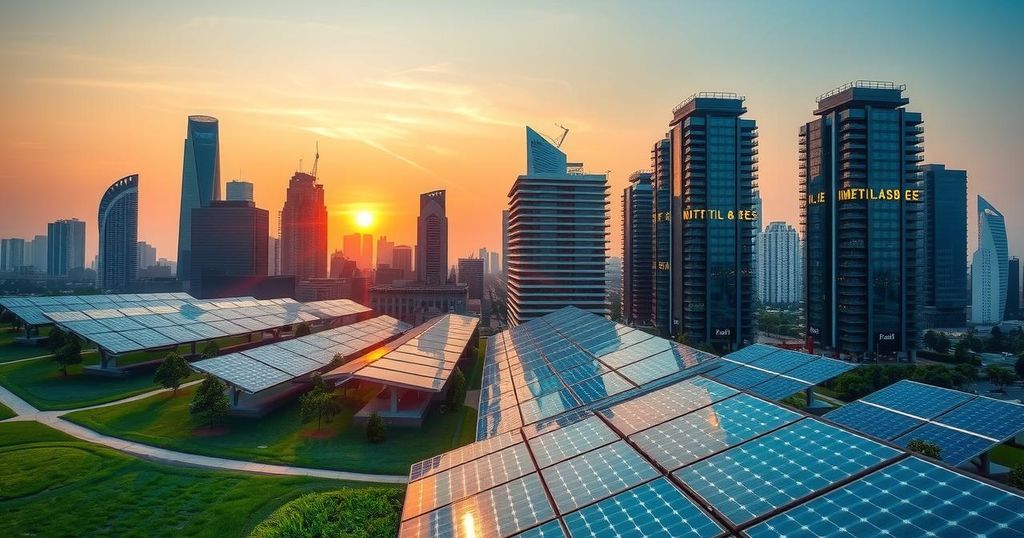Clean energy advocates are transitioning their messaging from environmental concerns to emphasizing economic benefits, such as job creation and wealth generation. This shift seeks to engage a broader audience, particularly conservatives, within a political climate increasingly influenced by self-interest. Significant investments in clean energy projects are underscored, suggesting that economic viability may be pivotal to garnering support for sustainability initiatives.
In an evolving climate narrative, clean energy advocates are shifting their messaging from environmental salvation to economic opportunity. Amid rising nationalism and corporate influences, the dialogue now highlights wealth generation and job creation, which resonates more effectively with contemporary audiences, particularly in the United States. The renewable energy sector is increasingly emphasizing profit potential, as demonstrated by recent lobbying efforts amidst an administration keen on fossil fuels.
Historically, discussions on climate change emphasized urgent responses to environmental degradation. However, recent trends show a pivot towards emphasizing economic robustness and job growth in sectors like solar and wind energy. Notably, former U.S. Representative Bob Inglis underscored the significant potential for generating wealth and employment through clean energy initiatives, suggesting that aligning messaging with self-interest may be key to broader support.
United Nations officials are acknowledging the economic imperatives accompanying clean energy investments. With $2 trillion already flowing into projects, they assert that the financial gains inherent in this transition can drive substantial progress. As communication strategies evolve, they focus more on appealing to individual and corporate self-interest, as stated by Princeton University’s Michael Oppenheimer, who indicated that this approach could facilitate climate solutions.
Industry leaders are channeling their lobbying efforts towards securing tax incentives to maintain competitive advantage against global energy players. By crafting messages that align climate goals with economic interests, they aim to engage lawmakers who are less receptive to the climate change narrative itself. Jessie Stolark, from the Carbon Capture Coalition, emphasized the importance of tailoring messages to resonate with what motivates audiences.
The interconnection between economic growth and environmental advocacy is being increasingly recognized, with leaders like Lisa Sachs from the Columbia Center on Sustainable Investment praising the newfound clarity in promoting the economic benefits of sustainable transitions. While acknowledging the limitations of market-driven solutions to climate issues, industry experts believe that a focused economic argument may be the most effective route forward.
Climate historians suggest that traditional approaches, which concentrate on dire climate warnings, have failed to generate substantial change. Therefore, adapting the conversation to center on economic incentives offers a fresh strategy to foster progress in climate initiatives. In summary, the current emphasis on jobs and wealth generation presents a pragmatic approach to advancing clean energy policies in an increasingly complex political landscape.
The article discusses the evolving rhetoric used by clean energy leaders in response to changing political dynamics, particularly under the Trump administration. It highlights a shift from a focus on environmental conservation to one that emphasizes economic benefits associated with clean energy initiatives. The push to frame renewable energy as a driver of job creation and economic growth reflects a strategic adaptation to appeal to a broader audience, especially among conservatives and lawmakers who may prioritize economic over ecological concerns. This shift becomes particularly salient in a context where clean energy initiatives are facing opposition from traditional energy sectors, necessitating a robust economic argument to retain legislative support. The emphasis on large-scale investment opportunities aims to create a compelling narrative that resonates with self-interest, thereby garnering necessary political backing and public support.
In conclusion, clean energy advocates are effectively reshaping their messaging to align with contemporary political climate and economic realities. By focusing on job creation and financial opportunities, they seek to engage a wider audience, particularly among those traditionally skeptical of climate change narratives. This strategic pivot underscores the crucial intersection between economic aspirations and the transition to sustainable energy, aiming for legislative support through appealing to self-interest.
Original Source: abcnews.go.com






